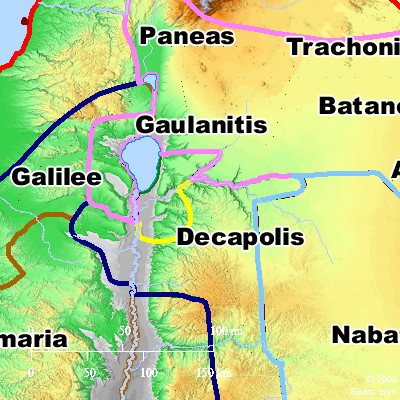Atlas  Decapolis and surrounding area Maps Created using Biblemapper 3.0 Additional data from OpenBible.info Occurrences Matthew 4:25 Great multitudes from Galilee, Decapolis, Jerusalem, Judea and from beyond the Jordan followed him.Mark 5:20 He went his way, and began to proclaim in Decapolis how Jesus had done great things for him, and everyone marveled. Mark 7:31 Again he departed from the borders of Tyre and Sidon, and came to the sea of Galilee, through the midst of the region of Decapolis. Encyclopedia DECAPOLISde-kap'-o-lis (Dekapolis): The name given to the region occupied by a league of "ten cities" (Matthew 4:25 Mark 5:20; Mark 7:31), which Eusebius defines (in Onomastica) as "lying in the Peraea, round Hippos, Pella and Gadara." Such combinations of Greek cities arose as Rome assumed dominion in the East, to promote their common interests in trade and commerce, and for mutual protection against the peoples surrounding them. DECAP'OLIS, a name meaning "ten cities," whose locations are not all certainly known, but their general region was e. and s. of the sea of Tiberias, as far as Damascus on the n. and Beth-shean on the s., including these cities. Strong's Greek G1179: DekapolisDecapolis, a region East of the Jordan |



